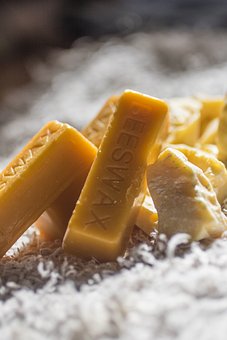Beeswax is a natural wax that is secreted by honeybees to build their honeycombs. The wax is produced in the worker bees’ wax glands, which are located on the underside of their abdomens. The bees chew the wax and shape it into hexagonal cells to store honey and raise their young.
How is Beeswax Harvested?
The process of harvesting beeswax is relatively simple. Beekeepers remove the honeycomb from the hive and use a heated knife or machine to cut off the top layer of wax, which contains the honey. The remaining wax is then melted down and filtered to remove any impurities. The resulting wax can be used in a variety of products, including candles, cosmetics, and food.
Is Beeswax Vegan?
The question of whether beeswax is vegan is a controversial one. On one hand, beeswax is a natural substance that is not derived from animals in the same way that leather or wool is. However, it is still a product that is produced by bees, and some vegans argue that exploiting bees for their wax is not in line with the principles of veganism.
Vegan Alternatives to Beeswax
If you are looking for a vegan alternative to beeswax, there are several options available. One popular alternative is soy wax, which is made from soybean oil and is commonly used in candles. Another option is candelilla wax, which is derived from the leaves of the candelilla shrub and is often used in cosmetics. Carnauba wax, which is derived from the leaves of the carnauba palm tree, is also a vegan alternative that is commonly used in food products.
Alternatives to Beeswax
For ethical consumers who choose to avoid beeswax, there are a number of vegan alternatives available. Soy wax, for example, is a popular alternative that has a similar texture and melting point to beeswax. Other options include carnauba wax, candelilla wax, and sunflower wax. These plant-based waxes can be used in a variety of products, including candles, skincare, and makeup.
Supporting Ethical Beekeeping Practices
For consumers who choose to use beeswax, it’s important to seek out products that are sourced from ethical beekeeping practices. This means looking for products that are labeled as organic, sustainably produced, or cruelty-free. Consumers can also support small-scale beekeepers and local honey producers, who are more likely to prioritize the health and wellbeing of their bees. By choosing ethical and sustainable sources of beeswax, consumers can enjoy the benefits of this natural substance while supporting practices that prioritize animal welfare and environmental sustainability.
The Ethics of Using Beeswax
Whether or not you consider beeswax to be vegan, there are ethical considerations to take into account when using it. One concern is the impact of beekeeping on the bees themselves. Commercial beekeeping practices can be harmful to bees, as they may be subjected to stress, disease, and pesticides. Additionally, the demand for beeswax can lead to over-harvesting, which can have a negative impact on bee populations.
The Benefits of Beeswax
While there are ethical considerations when it comes to using beeswax, there are also several benefits to this natural substance. Beeswax is a versatile material that is used in a variety of products, and it has many properties that make it desirable. For example, beeswax is a natural moisturizer and can be used in lotions and lip balms to soothe and protect the skin. It also has antimicrobial properties, making it an effective ingredient in natural cleaning products.
The Sustainability of Beekeeping
While the impact of beekeeping on bees is a concern for many ethical consumers, it’s worth noting that beekeeping can also have positive environmental impacts. Bees play a crucial role in pollinating crops, and many small-scale beekeepers focus on sustainable practices that prioritize the health and wellbeing of the bees. By supporting small-scale beekeepers and purchasing honey and beeswax from ethical sources, consumers can support sustainable agriculture and help protect bee populations.
The Importance of Transparent Labeling
One of the challenges of navigating the ethical considerations of using beeswax is the lack of transparency in labeling. Many products that contain beeswax do not clearly state where the wax comes from or whether it was ethically sourced. This makes it difficult for consumers to make informed choices about the products they purchase. As ethical consumers, it’s important to advocate for transparent labeling and seek out products that are labeled clearly and honestly.
Balancing Ethics and Convenience
As with many ethical choices, the decision of whether or not to use beeswax requires a balancing act between ethics and convenience. While there are certainly vegan alternatives to beeswax, they may not be as readily available or affordable as products that contain beeswax. Additionally, some consumers may find that the benefits of beeswax outweigh the ethical concerns. Ultimately, the decision of whether or not to use beeswax is a personal one that depends on individual values and priorities.
Conclusion
In conclusion, the question of whether or not beeswax is vegan is a complex one. While beeswax is not derived from animals in the same way that leather or wool is, it is still a product that is produced by bees, and some vegans argue that exploiting bees for their wax is not ethical. If you are looking for a vegan alternative to beeswax, there are several options available, including soy wax, candelilla wax, and carnauba wax. Ultimately, the decision of whether or not to use beeswax is up to the individual consumer, and it’s important to consider the ethical implications of this choice.

